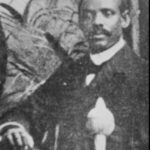KAKARI, KOFI
- 3 Min Read
Kofi Kakari (circa 1837-June 24, 1884) was Asantehene from 1867-74. During his reign, Asante forces reoccupied the coastal region of the Gold Coast. This resulted, however, in the Sagrenti War of 1873-74, during which the British seized Kumase, a development which led to the abdication of Kofi Kakari.
He was the second son of the Asante Queen-mother Afua Kobi, by her marriage to Kofi Nti, okyeame (spokesman) for the Boakye Yam Panin (spokesman’s) stool based in Kumase. Born in or around 1837, Kofi Kakari had no expectations of succeeding to the Golden Stool. After the death of Kwaku Dua I [reigned 1834-67], however, the dominant war party chose him as their candidate. In the struggle which ensued, Kofi Kakari was kidnapped by his opponents, and made to swear to refuse the stool, but his supporters maintained that an oath made under duress was invalid. He was installed as Asantehene in May 1867, and publicly affirmed his intention to lead the nation to war against the British.
In 1869-71, an army under Adu Bofo invaded the Ewe country, and secured Asante control of the eastern flanks of the Gold Coast. Simultaneously, forces under Akyampon Yaw carried out similar operations to the west. Late in 1872, Kofi Kakari committed his main forces under Amankwa Tia to a full invasion of the Gold Coast. The Asante reoccupation of its former southern provinces was, however, terminated by the revival of the peace party in Kumase in late 1873, when Kofi Kakari was obliged to recall his armies from the field.
In 1874 a British Expeditionary Force, under Sir Garnet Wolseley, fought its way to Kumase and sacked the town. A number of charges were brought against Kofi Kakari: that he had refused to heed his counsellors, that he had mismanaged the war, and that he had misused stool property. He abdicated in October 1874, and was banished from the capital.
Upon the removal of his successor, Asantehene Mensa Bonsu from office in 1883, a strong movement for the restoration of Kofi Kakari emerged. In the struggle which followed, the partisans of Kwaku Dua II [reigned 1884] finally triumphed over those of Kofi Kakari. Kwaku Dua II, however, died of smallpox on June 10, 1884, only 44 days after his enstoolment. Kofi Kakari’s candidacy was immediately revived, but he too died two weeks later, on June 24. Officially said to have died from dysentery, it is more likely that he was murdered by his opponents.
In his domestic policies, Kofi Kakari was a liberal and popular ruler, particularly remembered for his personal generosity. He lacked, however, the charisma which might have enabled him to control the intense rivalries between the peace and war parties within his administration. Too often he sought solace in the prayers of the Muslim advisers he so avidly recruited, while allowing his subordinate functionaries to assume control of the affairs of the nation.
IVOR WILKS



